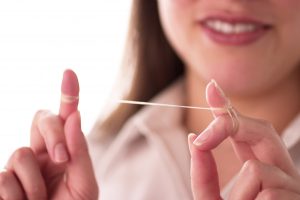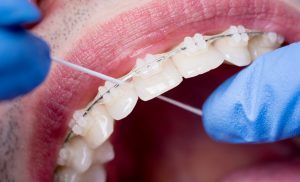Flossing daily is Important, Especially if you wear Braces
Did you know that most people lie about how often they floss? Most people aren’t telling their Orthodontist the whole truth about their flossing habits, especially kids. For many young people, flossing is already difficult and adding in the complication of metal braces in front of the teeth can turn the routine task of flossing into a real headache. Braces can attract food build-up and deposit extra material around the tooth, making sure to brush and floss routinely while wearing braces is vital. Flossing with braces can be a time-consuming endeavor, but it is crucial to maintaining proper tooth and gum health while wearing braces. Here are some key things to remember when flossing with braces:
Flossing Technique
There are many ways to floss your teeth. Traditional Floss, Waterpiks, and Disposable Flossers are some of the most common ways to floss. Using the right tools can make flossing easier. The benefits of traditional floss are that they most effectively dislodge gunk and build-up near the top of the tooth along the gums. Waterpiks may be easy to use, but they may not stimulate the gums as much as traditional floss. Using disposable flossers with braces is not an option. The fixed nature of the flosser head makes it impossible to thread the floss through the wiring, making it impossible to clean the entirety of the tooth.

When flossing teeth fitted with braces, the most practical method is to use tradition floss. To make sure you’re flossing effectively:
- Use about 18-24 inches of floss
- Wrap the floss around your thumb and index finger
- Thread the floss up around the wire between the tooth.
- Gently guide the floss up and down along the side of the tooth to the top of the edge of the gum.
- Use a soft up and down motion to clean the tooth before switching the opposite side.
- Make sure you go all the way to the gums around the tooth, this is wear build up occurs most.
- Carefully unthread the floss from under the wire, taking special care not to snag or bump the wire loose.
- Repeat with each tooth.
The Right Kind of Floss to Use
Traditional floss comes in two different varieties: waxed and unwaxed. Floss is commonly made from plastic or flaxen fibers that are woven together to form a string or line. Unwaxed floss is when the fibers are naturally spun without a coating to keep them together. Using unwaxed floss carries the risk of fraying, catching, or getting stuck on your braces. Because unwaxed floss has exposed fibers, they can fray and tear as the floss rubs against the metal wires and brackets in braces. Waxed floss means that a wax coating keeps the fibers together and protects them from fraying against the metal wires. Waxed floss will be more resistant to fraying and catching and will make flossing with braces easier.
If you haven’t flossed regularly, your gums may bleed or feel swollen after flossing. Using dental tape may be an option for you. Dental tape is more akin to a ribbon than the traditional string like floss. It’s low profile and gentle glide are easier on the gums making it one way to help get your mouth accustomed to flossing. Over time, your gums will become used to flossing and you will find that flossing no longer causes bleeding or swelling. Nothing will make your gums less prone to bleeding and swelling during flossing than flossing with regularity, so the best time to start is now, braces or no braces.

When to Floss
What is the best time of day to floss? The ADA recommends flossing just once per day. But when should you floss? For some, it makes sense to floss in the morning, preferring to start the day off right with fresh clean teeth. For others, flossing at night before bed is preferred because it provides the benefit of removing any build-up that may have been accrued during the day’s meals. Flossing after the mid-day meal is also an option to keep the teeth clean throughout the day. The truth is, the best time to floss is the time that works best for your schedule. It is so important to floss every day that it doesn’t really matter what time your teeth get cleaned as long as it happens on a routine basis.
Things to Avoid While Flossing with Braces
Aggressive brushing and flossing
Remember, treat your teeth with care. Firm but gentle brushing is what works best. Brush like you are cleaning rare and expensive dinosaur bones, not like you’re wire-scrubbing a grill after a barbeque. This is true for all teeth, but it is especially true for teeth with braces. The wires can be knocked loose if you brush too hard, or if you aren’t careful while flossing. Avoid unnecessary unscheduled trips to the Orthodontist by flossing and brushing gently.
Harmful Foods
The better you take care of your braces, the sooner they can come off. Certain foods will only make your braces more difficult to keep clean. Corn on the cob, Caramels, soft candies, and sugary treats will get stuck in your braces and make flossing difficult and brushing a chore. Take care to plan what you will eat so that you don’t make flossing a chore.
Whitening Toothpaste
Whitening toothpaste won’t affect your flossing. However, they are still important to avoid when wearing braces. Whitening toothpaste can cause uneven discoloration of the teeth while wearing braces because they don’t penetrate the layer in between the tooth and the bracket. If you are worried about whitening your teeth, that is something that can be done after your braces come off. That will ensure that they are both white and evenly colored.
Caring for your braces isn’t as hard as it seems. The best way to take care of your teeth is to create positive dental habits like always flossing at the same time of day, or brushing before bed. Wearing braces can be tough, if you need more tips on how to best handle life with braces, check out our Top 4 Life Hacks for Braces. The most important thing to remember when caring for your braces is that your Orthodontist is here to help! If you are having trouble with your braces, have questions about care, pain or discomfort, call McDonough Orthodontics to make an appointment 801-262-2662.
